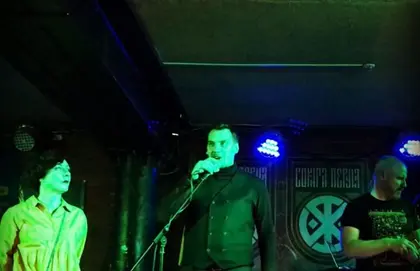Ukrainian Prime Minister Oleksiy Honcharuk has experienced a groundswell of criticism this week as photographs of him standing on stage with a stylized swastika draped behind him at a Veterans Strong party event were posted on Facebook.
The event was organized by Andriy Medvedko, a far-right activist who was charged with assassinating a pro-Russian journalist and writer Oles Buzina in April 2015. The Veterans Strong party was held to honor Ukraine’s patriots and armed forces on Oct. 13, on the eve of the Defender of Ukraine Day holiday on Oct. 14.
Honcharuk arrived with the Minister of Temporarily Occupied Territories and Internally Displaced Persons Oksana Koliada, who posted photos of the two of them on Facebook. The band playing at the event was Sokyra Peruna, a Neo-Nazi group whose stylized Nazi logo was displayed on the flag behind Honcharuk.
Yevhen Karas, the leader of the far-right organization C14 (named in reference to U.S. white nationalist David Lane’s “14 words”), was one of the first to share the pictures online. C14 is best known for a series of attacks on Roma camps.
Concert organizer Medvedko commented “88” on the photos on Facebook, which is common neo-Nazi code for “Heil Hitler.”
Bellingcat, an investigative journalism website that monitors far-right and anti-equality movements in Ukraine, tweeted about Honcharuk’s presence at the event late that night. Twelve hours later, Honcharuk posted his explanation on Facebook.
In the post, Honcharuk confirmed his presence at what was essentially a Neo-Nazi concert.
While he wrote that he didn’t “share any hateful ideologies – neither Nazism, Fascism, or Communism,” he also didn’t think through the projected image of the organizers and band and normalized the situation with additional arguments, stating, “the politicization of the situation was totally inappropriate and that it is not up to the government to dictate what our defenders to sing.”
This was in response to him standing on stage with a band singing songs like “Heroes of My Race” and “Glory to Skinheads of the Great Rus.”
At a briefing in the Cabinet on Oct. 16, Honcharuk said that he had never heard any songs of the band. He said that he was invited to the event by the veteran organization and accepted this invitation “out of respect to these people.”
“As much as I know, is that on this night there were many different band, with many different people. This was not a concert for one band that I specifically went for because I am some sort of fan of that band,” he said. There were three bands performing at the event.
Honcharuk said there are “many people” that try to “split society” using different reasons.
“They can make any of you into a Nazi fascist,” he said.
The fumbling situation showed lack of thought of the consequences, particularly as alt-right groups threaten President Volodymyr Zelensky over his peace efforts in Donbas and Russia leads a disinformation campaign against Ukraine by labeling it a country of Neo-Nazis.
While there certainly is a far-right element in Ukraine, it is much smaller than in other parts of Europe. For instance, the only nationalist party that participated in the July 2019 elections, Svoboda, got only 2 percent of the vote. For comparison, nationalist parties got 12% at the last election in Germany and France, and 17% in Italy.
You can also highlight the text and press Ctrl + Enter




